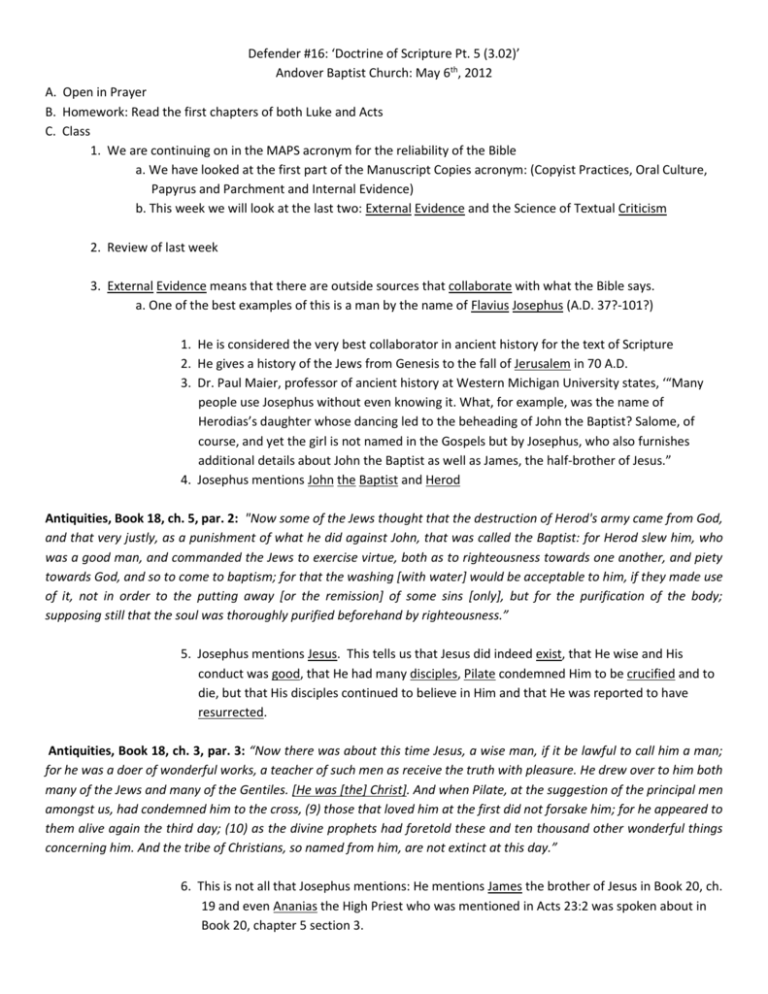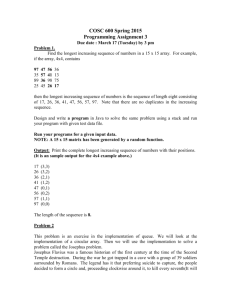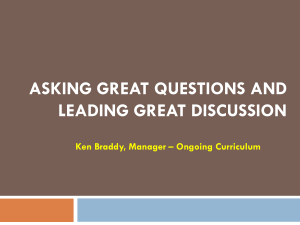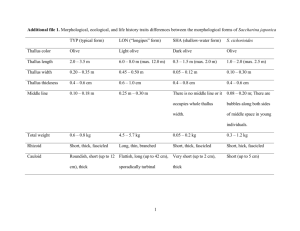Defender`s class #16
advertisement

Defender #16: ‘Doctrine of Scripture Pt. 5 (3.02)’ Andover Baptist Church: May 6th, 2012 A. Open in Prayer B. Homework: Read the first chapters of both Luke and Acts C. Class 1. We are continuing on in the MAPS acronym for the reliability of the Bible a. We have looked at the first part of the Manuscript Copies acronym: (Copyist Practices, Oral Culture, Papyrus and Parchment and Internal Evidence) b. This week we will look at the last two: External Evidence and the Science of Textual Criticism 2. Review of last week 3. External Evidence means that there are outside sources that collaborate with what the Bible says. a. One of the best examples of this is a man by the name of Flavius Josephus (A.D. 37?-101?) 1. He is considered the very best collaborator in ancient history for the text of Scripture 2. He gives a history of the Jews from Genesis to the fall of Jerusalem in 70 A.D. 3. Dr. Paul Maier, professor of ancient history at Western Michigan University states, ‘“Many people use Josephus without even knowing it. What, for example, was the name of Herodias’s daughter whose dancing led to the beheading of John the Baptist? Salome, of course, and yet the girl is not named in the Gospels but by Josephus, who also furnishes additional details about John the Baptist as well as James, the half-brother of Jesus.” 4. Josephus mentions John the Baptist and Herod Antiquities, Book 18, ch. 5, par. 2: "Now some of the Jews thought that the destruction of Herod's army came from God, and that very justly, as a punishment of what he did against John, that was called the Baptist: for Herod slew him, who was a good man, and commanded the Jews to exercise virtue, both as to righteousness towards one another, and piety towards God, and so to come to baptism; for that the washing [with water] would be acceptable to him, if they made use of it, not in order to the putting away [or the remission] of some sins [only], but for the purification of the body; supposing still that the soul was thoroughly purified beforehand by righteousness.” 5. Josephus mentions Jesus. This tells us that Jesus did indeed exist, that He wise and His conduct was good, that He had many disciples, Pilate condemned Him to be crucified and to die, but that His disciples continued to believe in Him and that He was reported to have resurrected. Antiquities, Book 18, ch. 3, par. 3: “Now there was about this time Jesus, a wise man, if it be lawful to call him a man; for he was a doer of wonderful works, a teacher of such men as receive the truth with pleasure. He drew over to him both many of the Jews and many of the Gentiles. [He was [the] Christ]. And when Pilate, at the suggestion of the principal men amongst us, had condemned him to the cross, (9) those that loved him at the first did not forsake him; for he appeared to them alive again the third day; (10) as the divine prophets had foretold these and ten thousand other wonderful things concerning him. And the tribe of Christians, so named from him, are not extinct at this day.” 6. This is not all that Josephus mentions: He mentions James the brother of Jesus in Book 20, ch. 19 and even Ananias the High Priest who was mentioned in Acts 23:2 was spoken about in Book 20, chapter 5 section 3. b. Cornelius Tactius (A.D. 55 to A.D. 117) is considered the greatest first century historian of the Roman Empire 1. Wrote the Annals which tells the history of Rome from Augustus to the death of Nero. 2. Wrote the Histories which tells the history of Rome from the death of Domitian to the end of the 1st Century 3. He wrote about how Nero accused the Christians of causing the fire that nearly destroyed Rome and collaborated that Jesus died at the hands of Pilate, the spreading of Christianity from Judea to Rome and mentions the Resurrection Tacticus: "Consequently, to get rid of the report, Nero fastened the guilt and inflicted the most exquisite tortures on a class hated for their abominations, called Christians by the populace. Christus, from whom the name had its origin, suffered the extreme penalty during the reign of Tiberius at the hands of one of our procurators, Pontius Pilatus, and a most mischievous superstition, thus checked for the moment, again broke out not only in Judaea, the first source of the evil, but even in Rome, where all things hideous and shameful from every part of the world find their centre and become popular." c. Thallus (A.D. 52) whose works are found only in citations by others such as Julius Africanus who in AD 221 quotes him as mentioning an eclipse of the sun and an earthquake in Judea 1. Could this have been the one in in Luke 23:44-45? 2. Julius Africanus believed it was Thallus mentioned in Julius Africanus’ writings: "On the whole world there pressed a most fearful darkness; and the rocks were rent by an earthquake, and many places in Judea and other districts were thrown down. This darkness Thallus, in the third book of his History, calls, as appears to me without reason, an eclipse of the sun." d. Gaius Suetonius Tranquillus (69/72? A.D. -after 130 A.D.?) makes mention of a ‘mischievous religious belief’ and that Jewish devotes were willing to suffer punishments for the sake of ‘Chrestus’ and that they saw him as the one who fulfilled all the animal sacrifices. Also collaborates the persecution that is mentioned in Acts 18:2 e. Pliny the Younger (61 A.D.-112 A.D.) governor of Bithynia in Asia Minor 1. A noted interrogator, torturer and killer of Christians 2. He would ask a person accused three times if they were a Christian and if they answered yes he quote, ‘order them to be taken away for execution; whatever they have admitted to, I am sure that their stubbornness and inflexible obstinacy ought to be punished.’ 3. He wanted to reestablish the worship of Caesar and destroy Christianity and his writings show that Christianity had spread to every echelon of society: from young to old, male to female and city and rural Pliny the Younger: "They (the Christians) were in the habit of meeting on a certain fixed day before it was light, when they sang in alternate verses a hymn to Christ, as to a god, and bound themselves by a solemn oath, not to any wicked deeds, but never to commit any fraud, theft or adultery, never to falsify their word, nor deny a trust when they should be called upon to deliver it up;after which it was their custom to separate, and then reassemble to partake of food—but food of an ordinary and innocent kind." f. Lucian (120? A.D. –after 180 A.D.) Lucian: "The Christians, you know, worship a man to this day—the distinguished personage who introduced their novel rites, and was crucified on that account. . . . You see, these misguided creatures start with the general conviction that they are immortal for all time, which explains the contempt of death and voluntary self-devotion which are so common among them; and then it was impressed on them by their original lawgiver that they are all brothers, from the moment that they are converted, and deny the gods of Greece, and worship the crucified sage, and live after his laws. All this they take quite on faith, with the result that they despise all worldly goods alike, regarding them merely as common property." g. These are just a taste of the mountains of evidence that the Bible and Christianity can be trusted. 4. The Science of Textual Criticism means that with the vast amount of manuscripts, quotes and the like we can rest assured that we have the biblical message as God intended us to have a. While all human copyists undoubtedly made mistakes, it is infeasible that that they all made the same mistakes b. The vast majority of mistakes are simply the misspelling of words c. In light of the massive amount of manuscript evidence it is fairly easy to come to a conclusion to the correct wording of any text in question d. What does this mean? We know beyond a shadow of a doubt the essential biblical message e. Dr. James White says it best, “The reality is that the amount of variation between the two most extremely different New Testament manuscripts would not fundamentally alter the message of the Scriptures!” D. Homework: Memorize the M-A-P-S acronym and the also the Manuscript Copies acronym E. Next Week: We will begin looking at the A = Archaeologists Spade F. Close in Prayer Resources: 1. Hannegraaff, Hank. Has God Spoken. Nashville:Thomas Nelson, 2011. Electronic 2. Koukl, Gregory, Ancient Words, Signal Hill, Stand to Reason, 2011. Print 3. Slick, Matthew, Mother of All Notebooks, Christian Apologetics & Research Ministry, 2012. Electronic











